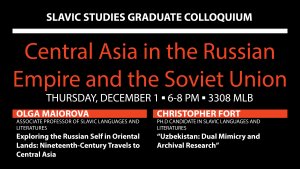Presented By: Slavic Languages & Literatures
Central Asia in the Russian Empire and the Soviet Union
Olga Maiorova, Christopher Fort

The theme of this Slavic Studies Graduate Colloquium is "Central Asia in the Russian Empire and the Soviet Union."
Olga Maiorova, Associate Professor of Russian
"Exploring the Russian Self in Oriental Lands: Nineteenth-Century Travels to Central Asia"
This talk focuses on the nineteenth-century explorers of Central Asia who shaped Russian public discourse on the Orient. It examines their visions of the exotic Other in the context of Russia’s own shifting national self-perception and offers insights into the ideological constructs underlying Russia’s unfolding imperial project.
Christopher Fort, Ph. D. Candidate in Slavic Languages and Literatures
"Uzbekistan: Dual Mimicry and Archival Research"
The Soviet Union encouraged its subjects to perform not only Soviet identities but also national ones, according to the formula "national in form, socialist in content". I posit that non-Russian litterateurs of the 1930s were under the influence of "dual mimicry," a concept which I adapt from post-colonial theorist Homi Bhabha's colonial mimicry. In the particular context of Socialist Realism, "dual mimicry" took on a particular form. While non-Russian authors were instructed to imitate Russian Socialist Realist texts - the first form of mimicry – they were also expected to mercilessly attack their literary predecessors, producing parody as the second form of mimicry. Focusing on the first novel, Mirage (1934), of celebrated Uzbek author Abdulla Qahhor (1907-1968), I am asking why the novel, despite its obvious ideological loyalty to the state, was not declared the first Uzbek Socialist Realist novel. This talk also integrates some new archival findings about Qahhor and notes about work in the Uzbek archives.
If you are a person with a disability who requires an accommodation to attend this event, please contact Carolyn Dymond, dymond@umich.edu or 734-764-5355, at least 3 days in advance of this event. Please be aware that advance notice is necessary as some accommodations may require more time for the University to arrange.
Olga Maiorova, Associate Professor of Russian
"Exploring the Russian Self in Oriental Lands: Nineteenth-Century Travels to Central Asia"
This talk focuses on the nineteenth-century explorers of Central Asia who shaped Russian public discourse on the Orient. It examines their visions of the exotic Other in the context of Russia’s own shifting national self-perception and offers insights into the ideological constructs underlying Russia’s unfolding imperial project.
Christopher Fort, Ph. D. Candidate in Slavic Languages and Literatures
"Uzbekistan: Dual Mimicry and Archival Research"
The Soviet Union encouraged its subjects to perform not only Soviet identities but also national ones, according to the formula "national in form, socialist in content". I posit that non-Russian litterateurs of the 1930s were under the influence of "dual mimicry," a concept which I adapt from post-colonial theorist Homi Bhabha's colonial mimicry. In the particular context of Socialist Realism, "dual mimicry" took on a particular form. While non-Russian authors were instructed to imitate Russian Socialist Realist texts - the first form of mimicry – they were also expected to mercilessly attack their literary predecessors, producing parody as the second form of mimicry. Focusing on the first novel, Mirage (1934), of celebrated Uzbek author Abdulla Qahhor (1907-1968), I am asking why the novel, despite its obvious ideological loyalty to the state, was not declared the first Uzbek Socialist Realist novel. This talk also integrates some new archival findings about Qahhor and notes about work in the Uzbek archives.
If you are a person with a disability who requires an accommodation to attend this event, please contact Carolyn Dymond, dymond@umich.edu or 734-764-5355, at least 3 days in advance of this event. Please be aware that advance notice is necessary as some accommodations may require more time for the University to arrange.
Explore Similar Events
-
Loading Similar Events...
